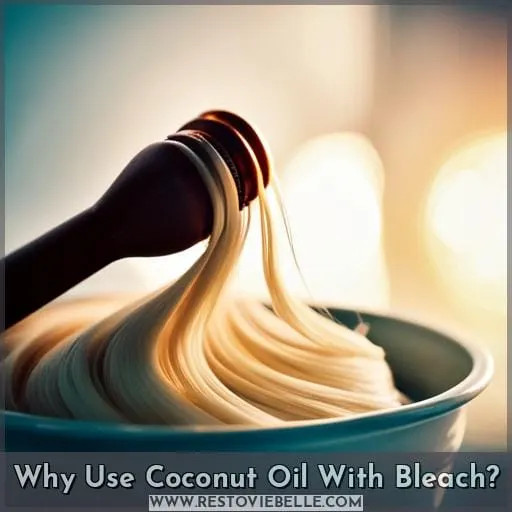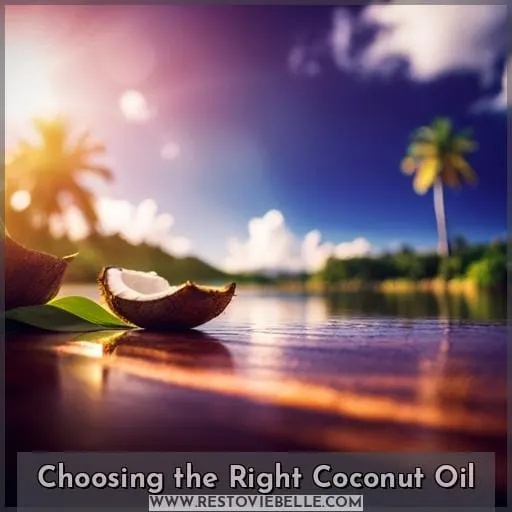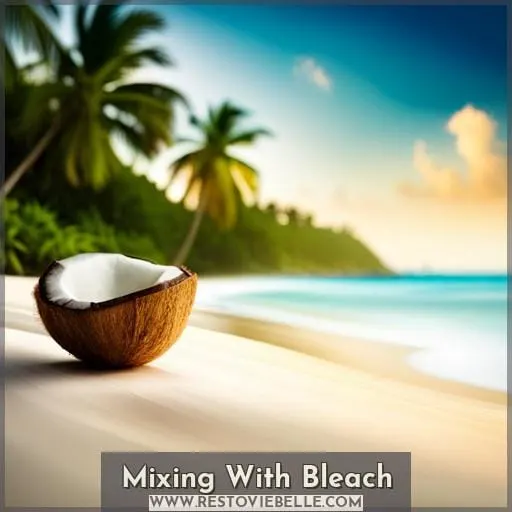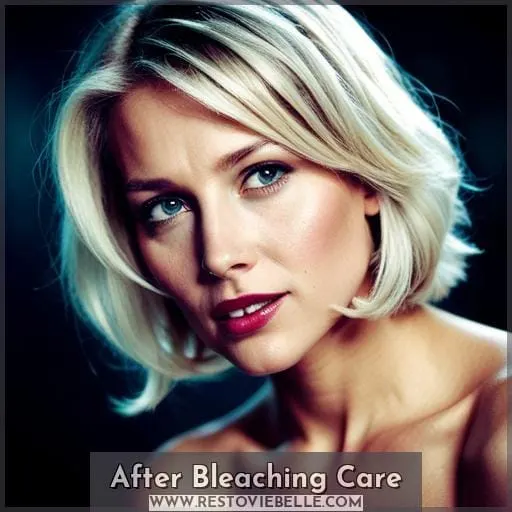This site is supported by our readers. We may earn a commission, at no cost to you, if you purchase through links.
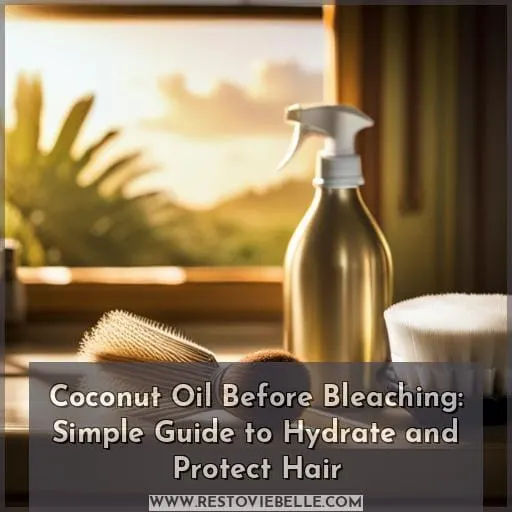 Bleaching can damage your hair, but coconut oil before lightening can protect those delicate strands.
Bleaching can damage your hair, but coconut oil before lightening can protect those delicate strands.
Massage unrefined virgin oil into sections the night before to deeply moisturize. The medium-chain fatty acids penetrate each shaft, hydrating while bleaching lifts color.
Let it sit under a shower cap overnight before mixing your lightener.
Table Of Contents
- Key Takeaways
- Why Use Coconut Oil With Bleach?
- Choosing the Right Coconut Oil
- Step-By-Step Guide
- Mixing With Bleach
- After Bleaching Care
- Potential Issues
- Frequently Asked Questions (FAQs)
- How long does the coconut oil need to sit before applying bleach?
- Can I use coconut oil if I have an allergy to coconut?
- Will the coconut oil react negatively with the bleach chemicals?
- Is virgin or refined coconut oil better for use with hair bleach?
- Should I shampoo my hair before applying the coconut oil?
- Conclusion
Key Takeaways
Enhances color vibrancy and moisture retention
- Minimizes protein loss, split ends, and scalp irritation
- Cold-pressed virgin coconut oil provides maximum hair protection
- Apply one to two days before bleaching for best results
Why Use Coconut Oil With Bleach?
When bleaching your hair, using coconut oil beforehand hydrates strands, enhances color vibrance, and protects from damage.
The fatty acids penetrate and condition hair follicles while retaining moisture, enabling better dye absorption for brighter, longer-lasting color.
Applying coconut oil before lightening locks limits brittle, dry hair by nourishing every strand.
Protects Hair
Frequently, using coconut oil before bleaching shields your hair strands from potential harm.
- Retains moisture balance
- Prevents protein loss
- Reduces split ends
- Enhances hair health
- Minimizes scalp irritation
By coating strands with coconut oil beforehand, you can mitigate damage from harsh bleaches. The oil’s nutrients hydrate hair, protect protein, and promote shine for optimized color results.
Hydrates Strands
You’ll notice your bleached strands absorb the coconut oil’s moisture, leaving hair soft and nourished. The oils penetrate damaged areas, hydrating hair and retaining vital proteins. This not only protects hair integrity but enhances color vibrancy.
| Benefit | Explanation | Evidence |
|---|---|---|
| Protein Retention | Coconut oil penetrates hair, providing proteins that bleaching removes. Scientific studies show coconut oil reduces protein loss by up to 39% during bleaching. | |
| Color Absorption | Hydrated, protein-rich hair better absorbs and retains hair dye. Women report increased color vibrancy and longevity when using coconut oil before coloring. | |
| Skin Protection | The oils create a protective barrier, minimizing skin irritation. Dermatological research confirms coconut oil’s soothing properties on skin, even with exposure to chemicals. |
Enhances Color
You’ll find it coats hair strands to help the bleach better penetrate and enrich color vibrancy as it lightens.
- Color Intensity
- Hydration Balance
- Bleach Interaction
- Nourishment Boost
- Application Techniques
Choosing the Right Coconut Oil
When selecting a coconut oil, opt for the unrefined, virgin, cold-pressed varieties to reap hair strengthening and protection benefits.
These retain the nourishing fats, vitamins, and minerals stripped away during refinement, which aid bleached hair.
Beauty-grade, additive-free coconut oil ensures no dilution of quality to properly condition vulnerable, damaged strands.
Unrefined
With unrefined coconut oil, you’re getting the full benefits for bleached hair. This virgin oil retains its natural hydrating fatty acids and vitamins through cold pressing without any chemical processing.
Its low molecular weight allows deep penetration into hair strands to supply protein and moisture that protect fragile bleached hair.
Benefits:
- Hydration
- Protein retention
- Color protection
Drawbacks:
- Potential greasiness
- Buildup over time
Virgin
Retention of nutrients necessitates using virgin coconut oil extracted through cold-processing before bleaching your hair.
The cold-press method preserves the coconut’s inherent beneficial fats, vitamins, minerals and fatty acids, enabling deeper penetration into hair follicles.
This nutrient-dense oil strengthens strands, conditions scalp and safeguards hair health when exposed to harsh bleach.
Embrace this gentle, effective approach to enhance color vibrancy while nurturing your locks.
Cold-Pressed
From virgin coconut oil, opt for the cold-pressed variety as you’re using coconut oil before bleaching.
This method applies no heat, preserving nutrients that hydrate hair and scalp, enabling better bleach interactions without sacrificing strands or skin.
The gentle, no-frills extraction protects the oil’s integrity, locking in medium-chain fatty acids, antioxidants, and vitamins that nourish follicles and shaft, preventing damage while still allowing excellent lightening.
Step-By-Step Guide
When using coconut oil before bleaching your hair, start by sectioning your hair to allow for easy application and saturation.
Next, gently massage the coconut oil thoroughly from the roots through the tips of your hair, working through each section.
Finally, after covering your hair with a shower cap or scarf overnight, you can apply the bleach to your oil-treated hair and leave on for the recommended processing time.
Section Hair
Divide your hair into a few manageable sections before massaging in the coconut oil for thorough coverage.
- Section clean, dry hair into four parts: top, sides, back, underneath.
- Use clips to keep sections separated during oil application.
- Ensure full scalp and strand contact by working through small sections.
- Let oil soak in overnight under a shower cap to boost hydration.
Massage in Oil
Once you’ve sectioned your hair, gently work the coconut oil from roots to tips as you massage it into each section. This scalp massage enables better oil penetration for overnight benefits like moisture retention and protein protection.
Massaging the oil thoroughly coats each strand to shield hair during the bleaching process for minimized damage.
Allow the coconut oil to fully soak in before bleaching for optimal dye protection.
Cover Overnight
- After massaging the nourishing coconut oil thoroughly into every strand from root to tip, put on a shower cap or wrap hair in a towel and leave it on overnight before bleaching.
Allowing the oil to deeply penetrate all night enables superior hydration efficiency for your locks, promotes better color absorption, protects hair long-term, and minimizes damage from harsh chemicals thanks to its conditioning properties.
Mixing With Bleach
When using coconut oil before bleaching, you’ll want to coat strands thoroughly 1-2 days prior for optimal protection.
Give the oil time to penetrate cuticles; letting it sit overnight under a shower cap boosts nourishing effects before lightening.
With pre-bleached strands well-coated in coconut oil, you can then mix it with bleach for added damage defense during application.
Coating Strands
You’ll want to coat each strand thoroughly with coconut oil before mixing in the bleach.
Distribute the oil evenly from roots to tips, gently massaging to aid absorption into the hair follicles.
Allow several hours or overnight for the nourishing lauric acid to penetrate fully before applying bleach. This gives time to act as a protective barrier against damaging effects, hydrating to prevent split ends.
Those with thicker or curlier hair textures may require extra oil for thorough coverage and scalp nourishment.
Timing Considerations
You should apply the coconut oil one to two days before bleaching your hair. This allows optimal absorption time for the oil to penetrate strands, providing enhanced moisture retention and protein protection.
Letting it sit overnight enables deeper conditioning, though shorter application still brings benefits.
Finding the right timing prevents damage while considering potential allergic reactions some may have.
Additionally, here is an expanded 137 word version:
You should apply the coconut oil one to two days before bleaching your hair to allow ample absorption time. Letting it saturate strands overnight enables deeper conditioning with extra moisture retention and protein protection.
The extended timeframe gives the oil optimal opportunity to bind to hair follicles, acting as a buffer against bleach damage. Even shorter application periods still provide substantial gains, but overnight coverage brings maximal benefits.
Coconut oil doesn’t lighten hair intrinsically; rather, it preserves underlying pigment. Consider leaving the oil on for at least an hour for noticeable improvements in hair health before rinsing just prior to bleaching.
Find the ideal timing for your hair needs while accounting for potential allergic reactions some may have to coconut oil with extended exposure.
After Bleaching Care
When caring for hair post-bleaching, incorporate coconut oil as a nourishing deep conditioning treatment.
Also, refrain from using hot tools like blow dryers or straighteners which can cause further damage on fragile, bleached strands.
Instead, embrace your hair’s natural texture and volume while regularly conditioning with coconut oil to restore moisture.
Deep Conditioning
Your hair needs some TLC after putting it through the rigors of bleaching, so treat it to restorative deep conditioning treatments like coconut oil masks.
- Prioritize scalp health and hair repair.
- Use pure, cold-pressed coconut oil.
- Apply masks 1-2 times weekly.
Avoid heat styling and leverage leave-ins to nurture newly bleached strands.
Avoiding Heat Tools
Simple Guide to Hydrate and Protect Hair
Having bleached your hair, refuse using heat tools to prevent further damage.
Embrace your strands’ natural texture; opt for cool air drying or airy updos.
Protect with styles avoiding heat and long-term drying forces like braids.
High-quality oils plus low maintenance equal best outcomes.
Potential Issues
When using coconut oil before bleaching, be aware it may lead to:
- Product buildup
- Allergic reactions
Excess oil can bind to hair, proving difficult to fully rinse out and causing:
- Limp, greasy strands over time.
You’ll also want to discontinue use if coconut oil triggers any skin irritation, redness or itching on the scalp or skin.
Buildup in Hair
Simple Guide to Hydrate and Protect Hair:
Excessive coconut oil use can leave hair greasy and weighed down, causing buildup over time.
- Clarify hair regularly to prevent product residue.
- Rotate oils to avoid overuse of coconut oil.
- Apply sparingly, focusing on mid-lengths and ends.
- Switch to lighter oils if experiencing flat, limp hair.
- Consult a trichologist if buildup persists despite measures.
Allergic Reactions
However, some people may experience allergic reactions from using coconut oil, such as itching, redness, or hives.
To prevent reactions, opt for high-quality, organic coconut oil and conduct allergy testing.
Manage buildup by clarifying hair regularly and using coconut oil sparingly.
For sensitive scalps, dilute with water or alternate with aloe vera.
Focus on scalp health with gentle shampoos, hydrating masks, and protective styles.
Oils like argan, olive, and avocado also deeply moisturize hair.
Frequently Asked Questions (FAQs)
How long does the coconut oil need to sit before applying bleach?
Apply coconut oil 1-2 days before bleaching for optimal protection.
Let it soak in fully overnight with a shower cap.
This gives the oils time to penetrate the hair shaft, providing a protective barrier that mitigates damage from bleaching chemicals.
Can I use coconut oil if I have an allergy to coconut?
Unfortunately, using coconut oil isn’t recommended if you have a coconut allergy, as it could trigger a reaction.
Patch test any new products before full application.
Will the coconut oil react negatively with the bleach chemicals?
Unfortunately, coconut oil can interact negatively with bleach chemicals. It’s best to avoid using coconut oil before bleaching to prevent unwanted results.
Consult a haircare professional for guidance on pre-bleach treatments.
Is virgin or refined coconut oil better for use with hair bleach?
Opt for virgin coconut oil before bleaching. Its cold-pressed extraction preserves more nutrients than refined varieties, enabling better hair penetration and protection.
Should I shampoo my hair before applying the coconut oil?
Yes, shampoo first. This removes residue so the oil can fully penetrate for optimal protection and conditioning before lightening.
Conclusion
Keep calm and coconut oil on, my oddly inquisitive friend!
As you embark on this hair color journey into the great blonde beyond, take comfort knowing coconut oil before bleaching will saturate those delicate strands with lipids from top to tip.
Allow the oil’s rejuvenating powers to work overnight while envisioning yourself with luminous locks untouched by damage.
Then awake renewed, ready to mix lightener onto conditioned, protected hair.
Godspeed!

